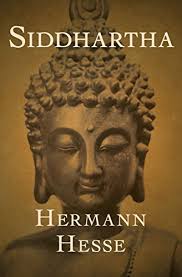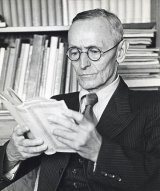Siddhartha Page #2
Siddhartha is a novel by Hermann Hesse that deals with the spiritual journey of self-discovery of a man named Siddhartha during the time of the Gautama Buddha. The book, Hesse's ninth novel, was written in German, in a simple, lyrical style.
Thus were Siddhartha's thoughts, this was his thirst, this was his suffering. Often he spoke to himself from a Chandogya-Upanishad the words: "Truly, the name of the Brahman is satyam--verily, he who knows such a thing, will enter the heavenly world every day." Often, it seemed near, the heavenly world, but never he had reached it completely, never he had quenched the ultimate thirst. And among all the wise and wisest men, he knew and whose instructions he had received, among all of them there was no one, who had reached it completely, the heavenly world, who had quenched it completely, the eternal thirst. "Govinda," Siddhartha spoke to his friend, "Govinda, my dear, come with me under the Banyan tree, let's practise meditation." They went to the Banyan tree, they sat down, Siddhartha right here, Govinda twenty paces away. While putting himself down, ready to speak the Om, Siddhartha repeated murmuring the verse: Om is the bow, the arrow is soul, The Brahman is the arrow's target, That one should incessantly hit. After the usual time of the exercise in meditation had passed, Govinda rose. The evening had come, it was time to perform the evening's ablution. He called Siddhartha's name. Siddhartha did not answer. Siddhartha sat there lost in thought, his eyes were rigidly focused towards a very distant target, the tip of his tongue was protruding a little between the teeth, he seemed not to breathe. Thus sat he, wrapped up in contemplation, thinking Om, his soul sent after the Brahman as an arrow. Once, Samanas had travelled through Siddhartha's town, ascetics on a pilgrimage, three skinny, withered men, neither old nor young, with dusty and bloody shoulders, almost naked, scorched by the sun, surrounded by loneliness, strangers and enemies to the world, strangers and lank jackals in the realm of humans. Behind them blew a hot scent of quiet passion, of destructive service, of merciless self-denial. In the evening, after the hour of contemplation, Siddhartha spoke to Govinda: "Early tomorrow morning, my friend, Siddhartha will go to the Samanas. He will become a Samana." Govinda turned pale, when he heard these words and read the decision in the motionless face of his friend, unstoppable like the arrow shot from the bow. Soon and with the first glance, Govinda realized: Now it is beginning, now Siddhartha is taking his own way, now his fate is beginning to sprout, and with his, my own. And he turned pale like a dry banana-skin. "O Siddhartha," he exclaimed, "will your father permit you to do that?" Siddhartha looked over as if he was just waking up. Arrow-fast he read in Govinda's soul, read the fear, read the submission. "O Govinda," he spoke quietly, "let's not waste words. Tomorrow, at daybreak I will begin the life of the Samanas. Speak no more of it." Siddhartha entered the chamber, where his father was sitting on a mat of bast, and stepped behind his father and remained standing there, until his father felt that someone was standing behind him. Quoth the Brahman: "Is that you, Siddhartha? Then say what you came to say." Quoth Siddhartha: "With your permission, my father. I came to tell you that it is my longing to leave your house tomorrow and go to the ascetics. My desire is to become a Samana. May my father not oppose this." The Brahman fell silent, and remained silent for so long that the stars in the small window wandered and changed their relative positions, 'ere the silence was broken. Silent and motionless stood the son with his arms folded, silent and motionless sat the father on the mat, and the stars traced their paths in the sky. Then spoke the father: "Not proper it is for a Brahman to speak harsh and angry words. But indignation is in my heart. I wish not to hear this request for a second time from your mouth." Slowly, the Brahman rose; Siddhartha stood silently, his arms folded. "What are you waiting for?" asked the father. Quoth Siddhartha: "You know what." Indignant, the father left the chamber; indignant, he went to his bed and lay down. After an hour, since no sleep had come over his eyes, the Brahman stood up, paced to and fro, and left the house. Through the small window of the chamber he looked back inside, and there he saw Siddhartha standing, his arms folded, not moving from his spot. Pale shimmered his bright robe. With anxiety in his heart, the father returned to his bed. After another hour, since no sleep had come over his eyes, the Brahman stood up again, paced to and fro, walked out of the house and saw that the moon had risen. Through the window of the chamber he looked back inside; there stood Siddhartha, not moving from his spot, his arms folded, moonlight reflecting from his bare shins. With worry in his heart, the father went back to bed. And he came back after an hour, he came back after two hours, looked through the small window, saw Siddhartha standing, in the moon light, by the light of the stars, in the darkness. And he came back hour after hour, silently, he looked into the chamber, saw him standing in the same place, filled his heart with anger, filled his heart with unrest, filled his heart with anguish, filled it with sadness. And in the night's last hour, before the day began, he returned, stepped into the room, saw the young man standing there, who seemed tall and like a stranger to him. "Siddhartha," he spoke, "what are you waiting for?" "You know what." "Will you always stand that way and wait, until it'll becomes morning, noon, and evening?" "I will stand and wait. "You will become tired, Siddhartha." "I will become tired." "You will fall asleep, Siddhartha." "I will not fall asleep." "You will die, Siddhartha." "I will die." "And would you rather die, than obey your father?" "Siddhartha has always obeyed his father." "So will you abandon your plan?" "Siddhartha will do what his father will tell him to do." The first light of day shone into the room. The Brahman saw that Siddhartha was trembling softly in his knees. In Siddhartha's face he saw no trembling, his eyes were fixed on a distant spot. Then his father realized that even now Siddhartha no longer dwelt with him in his home, that he had already left him.
Translation
Translate and read this book in other languages:
Select another language:
- - Select -
- 简体中文 (Chinese - Simplified)
- 繁體中文 (Chinese - Traditional)
- Español (Spanish)
- Esperanto (Esperanto)
- 日本語 (Japanese)
- Português (Portuguese)
- Deutsch (German)
- العربية (Arabic)
- Français (French)
- Русский (Russian)
- ಕನ್ನಡ (Kannada)
- 한국어 (Korean)
- עברית (Hebrew)
- Gaeilge (Irish)
- Українська (Ukrainian)
- اردو (Urdu)
- Magyar (Hungarian)
- मानक हिन्दी (Hindi)
- Indonesia (Indonesian)
- Italiano (Italian)
- தமிழ் (Tamil)
- Türkçe (Turkish)
- తెలుగు (Telugu)
- ภาษาไทย (Thai)
- Tiếng Việt (Vietnamese)
- Čeština (Czech)
- Polski (Polish)
- Bahasa Indonesia (Indonesian)
- Românește (Romanian)
- Nederlands (Dutch)
- Ελληνικά (Greek)
- Latinum (Latin)
- Svenska (Swedish)
- Dansk (Danish)
- Suomi (Finnish)
- فارسی (Persian)
- ייִדיש (Yiddish)
- հայերեն (Armenian)
- Norsk (Norwegian)
- English (English)
Citation
Use the citation below to add this book to your bibliography:
Style:MLAChicagoAPA
"Siddhartha Books." Literature.com. STANDS4 LLC, 2024. Web. 21 Dec. 2024. <https://www.literature.com/book/siddhartha_24>.




Discuss this Siddhartha book with the community:
Report Comment
We're doing our best to make sure our content is useful, accurate and safe.
If by any chance you spot an inappropriate comment while navigating through our website please use this form to let us know, and we'll take care of it shortly.
Attachment
You need to be logged in to favorite.
Log In